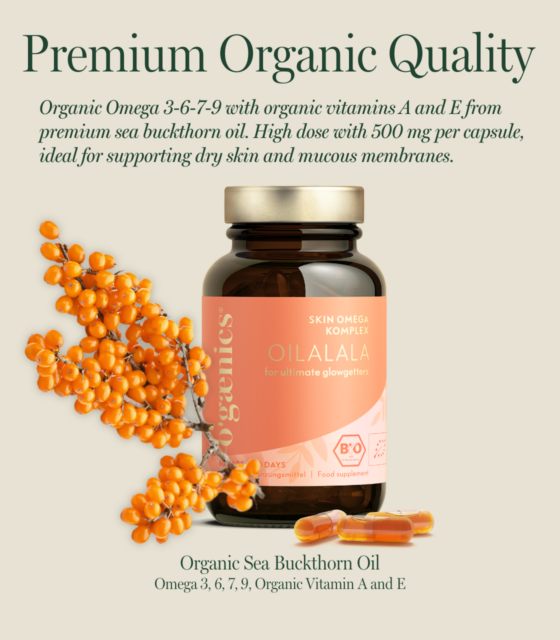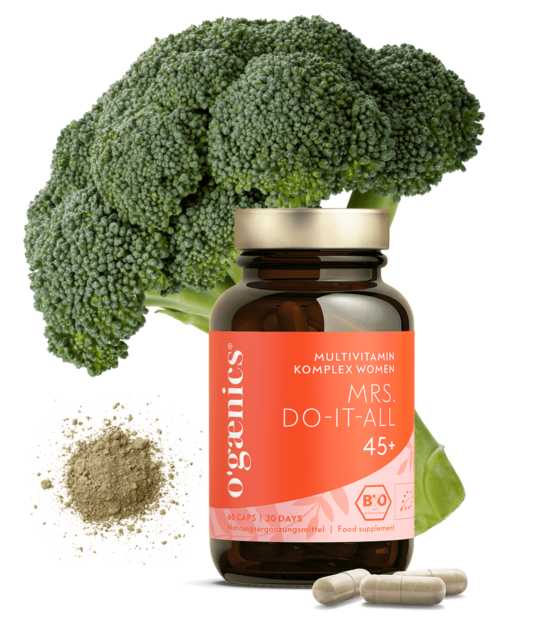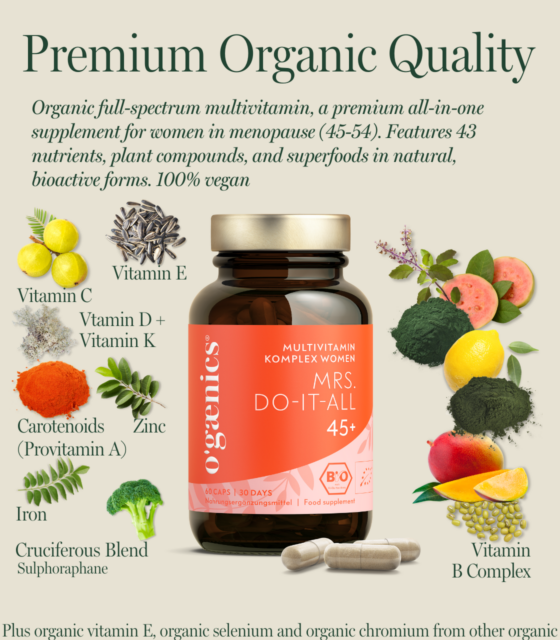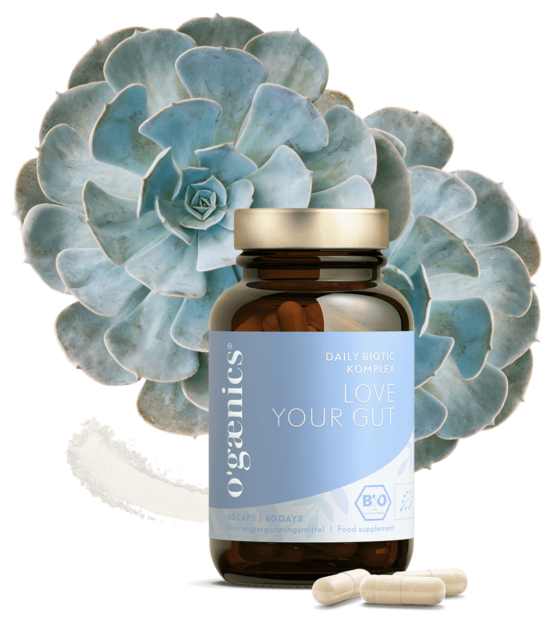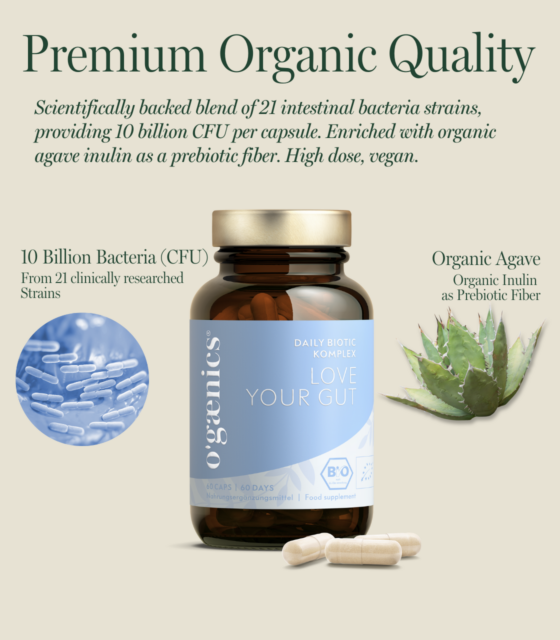IN THIS ARTICLE
Causes and natural, hormone-free solutions for vaginal dryness during the menopause.
Vaginal dryness is a common problem, especially during the menopause, but hardly anyone talks about it. But why should we keep quiet? It affects more than 40% of women – and you may be one of them. The technical term is vaginal or vulvovaginal atrophy. It causes symptoms such as dryness, reduced secretions, itching, burning, symptoms of an irritated bladder and pain during intercourse. If you experience this uncomfortable feeling of dryness, itching or burning, you are not alone. There are so many ways you can help yourself naturally without having to resort to hormones. Let’s break the taboo and look together at how a change in diet and natural supplements can support your vaginal health.
Vaginal dryness: why does it happen at all?
Vaginal dryness often occurs during the menopause because oestrogen levels fall. This female sex hormone keeps the vaginal mucosa elastic and moist. When there is less of it in the body, the mucous membrane becomes thinner, drier and less well supplied with blood, which can lead to unpleasant symptoms. But it’s not just the menopause that plays a role. Vaginal dryness can be caused by several factors. We’ve given you a comprehensive list of possible triggers.
- Hormonal changes: During breastfeeding and pregnancy, lower oestrogen levels can lead to temporary vaginal dryness.
- Medication: Some medications such as antidepressants, antihistamines, blood pressure medication and hormonal contraceptives can have vaginal dryness as a side effect.
- Cancer treatments: Chemotherapy and radiotherapy can damage the vaginal mucosa and cause dryness.
- Stress and anxiety: Emotional stress can disrupt the hormonal balance and trigger vaginal dryness.
- Sjögren’s syndrome: This autoimmune disease can affect the production of moisture in the body, including the vagina.
- Vaginal douching and irritants: Fragrances, intimate sprays and certain detergents can irritate the mucous membrane, remove natural moisture and cause dryness.
- Smoking: It reduces blood flow and can therefore reduce the moisture of the vaginal mucosa.
- Dehydration: Insufficient fluid intake can reduce overall body hydration, including the vagina.
- Vaginal infections: Yeast or bacterial infections can affect the vaginal mucosa and lead to dryness.
By avoiding or treating these factors, you can reduce the risk of vaginal dryness and improve your vaginal health. But don’t worry, there are many ways you can bring your mucous membranes back into balance – in a completely natural way.
The role of nutrition in vaginal dryness: how you can support your body from the inside
What we eat has a major impact on our health – and this also applies to the vaginal mucosa. The right diet can help to maintain the moisture and elasticity of your mucous membranes. Here are some important nutrients that play a role in this:
1. omega fatty acids: your allies against vaginal dryness
Omega-3, omega-6 and omega-7 fatty acids are essential fatty acids that are particularly important for the health of mucous membranes. They help to nourish the skin and mucous membranes from the inside and alleviate dryness.
- You can find omega-3 fatty acids in fatty fish such as salmon, mackerel and herring, as well as in plant sources such as linseed and chia seeds.
- Omega-6 fatty acids are found in vegetable oils such as sunflower oil or safflower oil.
- Omega-7 fatty acids, which are particularly valuable for the vaginal mucosa, can be found in sea buckthorn oil.
A tip for you: If you find it difficult to get enough healthy omega fatty acids from your diet, there are also high-quality dietary supplements. For example, the Oilalala Skin Omega Complex from Ogaenics contains a unique combination of omega-3, -6, -7 and -9 fatty acids from organic sea buckthorn oil. Bonus: The oil not only supports the vaginal mucosa, but also improves the elasticity and moisturization of your skin.
2. phytoestrogens: natural support for your hormone balance
Phytoestrogens are plant substances that can have a similar effect to oestrogen in the body. However, they are much milder than the body’s own hormone. Due to their structural similarity to oestrogen, they are often used as a gentle aid against symptoms of the menopause such as vaginal dryness. However, many women are concerned that phytoestrogens could increase the risk of hormone-dependent cancers such as breast cancer. But what do the scientific studies really say?
Facts about phytoestrogens and cancer:
- Protection instead of risk: Research results show that moderate consumption of phytoestrogens, especially from soy, does not increase the risk of hormone-dependent cancers. On the contrary: many studies, especially in Asian countries, have even found a protective effect. Women who regularly consume soy products have a lower risk of breast cancer there.
- During cancer treatment: If you have already been diagnosed with hormone-dependent tumors, you should be careful, however, as phytoestrogens could potentially interfere with the effect of certain cancer therapies. In this case, talk to your doctor before consuming large amounts of phytoestrogens.
Foods with phytoestrogens:
- Soy products such as tofu and soy milk
- Flaxseed
- Wholemeal products
- Broccoli and other cruciferous vegetables
- Berries
If you’re looking for an easy way to incorporate phytoestrogens and other supportive botanicals into your diet, there are specific supplements available. The Mrs Do It All 45+ Organic Multivitamin from Ogaenics contains a cruciferous vegetable blend that is rich in phytoestrogens and supports you naturally during the menopause. This gives you all the benefits of cruciferous vegetables such as broccoli and cabbage in a convenient daily dose. Phytoestrogens therefore offer a safe and natural way for most women to compensate for hormone deficiency during the menopause and alleviate symptoms such as vaginal dryness – without the risks of hormone replacement therapy.
-
Bestseller
Mrs Do-It-All 45+
Organic Multivitamin Complex Premium for menopausal women, All-In-One!79,90 €
1.997,50 € / kg
3. vitamin E: the moisture booster for your mucous membranes
Vitamin E is known for its antioxidant and anti-inflammatory properties. It helps to retain moisture in the cell membranes and protects the skin and mucous membranes from drying out. For menopausal women in particular, an additional intake of vitamin E through food or in the form of supplements can work wonders.
Foods with vitamin E:
- Nuts and seeds, e.g. almonds, sunflower seeds
- Fennel, salsify, sweet potato
- Shrimps, crustaceans
A tip for you: If you snack on a handful of almonds from time to time, you can already do a lot for your vaginal mucous membranes.
4 Probiotics: Restore the balance of the vaginal flora
A healthy vaginal flora is crucial for the moisture and health of the mucous membranes. Probiotics help to support the balance of “good” bacteria in your body and thus also promote vaginal health.
Probiotic foods:
- Yogurt with live cultures
- Kefir
- Sauerkraut and other fermented foods
An insider tip: probiotic food supplements such as the Love Your Gut Daily Biotic Complex from Ogaenics also support the microbiome of your vaginal flora. Healthy flora not only helps against vaginal dryness, but also strengthens your immune system.
-
Bestseller
Love Your Gut
Bio Daily Biotic Complex Premium for the gut: 21 bacterial strains plus organic fiberab 29,90 €
Lifestyle changes and stress management for vaginal dryness
In addition to diet, there are other factors that can positively influence your vaginal health. Vaginal dryness is often also a result of stress or hormonal fluctuations, which can occur not only during the menopause. Here are a few practical tips on how you can achieve great results by making small changes in your everyday life:
1. reduce stress: Mindfulness and relaxation
Stress can upset your hormone balance and therefore also have a negative impact on your mucous membranes. Regular relaxation techniques such as yoga, meditation or simply going for a walk in nature can help you to reduce stress. This will also help you regain your mental balance, which has a positive effect on your body. Our tip for you: try a 10-minute meditation in the morning or a 1-minute guided short meditation in between, a selection of which we have put together for you free of charge. You’ll notice how good it is to calm your mind.
2. exercise: Stay active to keep your body in balance
Exercise is not only important for general health, but also for blood circulation – which in turn promotes healthy mucous membranes. Whether it’s gentle exercises such as yoga, swimming or simply going for a walk – any form of exercise gets your circulation going and helps your body to function optimally.
3. minimize disruptive factors: Nonoxynol-9 (N-9)
This chemical, which is used in some condoms and spermicides, can also cause vaginal dryness. If you use condoms, make sure they are N-9 free to avoid irritation and dryness.
Food supplements: What really helps with vaginal dryness?
Sometimes nutrition alone is not enough to give your body the support it needs. That’s when dietary supplements come into play. They can provide targeted nutrients that are difficult to get in sufficient quantities from your daily diet.

Sea buckthorn oil: your secret weapon against vaginal dryness
Sea buckthorn oil is a particularly effective natural remedy for vaginal dryness. It contains plenty of omega-7 fatty acids, which nourish and protect your mucous membranes. Clinical studies have shown that taking sea buckthorn oil can significantly improve vaginal moisture. Women who took 3,000 mg of sea buckthorn oil daily reported a 50 percent improvement in their vaginal mucosa. Our tip: The Oilalala Skin Omega Complex is a great way to provide your body with the valuable omega fatty acids from sea buckthorn oil. The capsules are easy to take and work not only on vaginal health but also on your skin – a double win!

Probiotics as daily companions
In addition to sea buckthorn oil, probiotic supplements such as the Love Your Gut Daily Biotic Complex can help you keep your vaginal mucosa in top condition. Regular use of these supplements provides continuous support for your mucous membranes and helps to prevent dryness in the long term.
-
Bestseller
Love Your Gut
Bio Daily Biotic Complex Premium for the gut: 21 bacterial strains plus organic fiberab 29,90 €
Conclusion: You are in control
Vaginal dryness doesn’t have to be an unavoidable problem. With the right diet, regular exercise and targeted supplements, you can support the health of your vaginal mucosa and alleviate unpleasant symptoms such as dryness and itching. Take the problem in hand, try out the natural approaches and find out what works best for you. You will see that with a few adjustments to your everyday life, you can return to a pleasant and fulfilling life. Vaginal dryness is not a taboo subject – there are natural solutions to help you feel comfortable in your body again. You are not alone and you can do something about it!
- Weber, M A et al. “Assessment of vaginal atrophy: a review.” International urogynecology journal vol. 26,1 (2015): 15-28. doi:10.1007/s00192-014-2464-0
- Domoney, Claudine. “Treatment of vaginal atrophy.” Women’s health (London, England) vol. 10.2 (2014): 191-200. doi:10.2217/whe.14.9
- Zielińska, Aleksandra, and Izabela Nowak. “Abundance of active ingredients in sea-buckthorn oil.” Lipids in health and disease vol. 16.1 95. 19 May. 2017, doi:10.1186/s12944-017-0469-7
- Larmo, Petra S et al. “Effects of sea buckthorn oil intake on vaginal atrophy in postmenopausal women: a randomized, double-blind, placebo-controlled study.” Maturitas vol. 79.3 (2014): 316-21. doi:10.1016/j.maturitas.2014.07.010
- Parnan Emamverdikhan, Aazam et al. “A survey of the therapeutic effects of vitamin E suppositories on vaginal atrophy in postmenopausal women.” Iranian journal of nursing and midwifery research vol. 21.5 (2016): 475-481. doi:10.4103/1735-9066.193393
- Muhleisen, Alicia L, and Melissa M Herbst-Kralovetz. “Menopause and the vaginal microbiome.” Maturitas vol. 91 (2016): 42-50. doi:10.1016/j.maturitas.2016.05.015
Der Beitrag Vaginal dryness during the menopause: what helps erschien zuerst auf Ogaenics.



